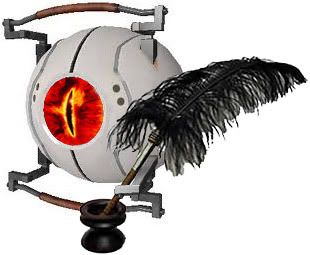
I was reading this article, by Alain Miles on Writers Without Borders, which enthuses about where novels may be headed now that eReaders are becoming more and more common.
The article is great, although I disagree with the idea that more interactivity will make books better. I can see illustrations you can "play" with being a great addition to children's books, but to me, having to interact with the book itself, in any significant way, is just a distraction from the story.
To me, a book should slurp you into its world, not yank your attention away from it. I find flipping the page an invisible-enough activity, but if there are moving pictures on the screen? If I am prompted to pause my reading in order to play a video? Good Google, I find typos annoying--interactive content would drive me mental.
What I want from a novel is to get sucked in so powerfully that I miss my bus stop, that I don't hear the phone ring, that I find myself unable to put the book down even though I have to be up for work in 4 hours and my eyeballs feel like matzo ball vindaloo.
That said, if a story is gripping enough, I'm sure the interactive content would become as invisible as my bus stop does. Regardless, to me, it's not a desirable feature to add things that I plan to ignore anyway.
However, one thing the article mentions did zap by brain with thrill-juice. It notes Stefano Boscutti has a project to try to create "stories that can change in reaction to a reader’s physiological responses".
Now that could be awesome. Imagine an all-purpose book that turns into a romance novel, a horror novel, or an adventure novel, all based on which sentences make your palms sweat. The whole concept may be science fiction at this point, but it's the right idea: a device that measures my unconscious responses could potentially add value to my novel-reading experience without distracting me.
However, an infinitely-changeable, all-purpose book would also ensure people couldn't discuss their books with each other. The novel's plot would become personalized and irreproducible--non-portable, to put it in computer terms. It would exist only in your head, and the novel you read and adore wouldn't be the same novel your friend reads and adores.
And that brings up the issue of copyright. Who really wrote the book, if your body's responses helped dictate its text?
Also, as a writer, I recognize creating an all-purpose book would be daunting. You would either have to write a multitude of books, each branching in separate directions like a choose-your-own-plot novel, or the book would have to be written by a cloud of writers, each handling their own separate sub-plots.
Or--even more frighteningly--you would have to devise a computer program that seamlessly branches the story into uncountable directions. Sure, human writers would be needed to set up such a program, but once it's completed, would the computer then make human writers obsolete?
My brain is buzzing with the possibilities. None of this will happen soon, based on our current level of technology, but what if it does someday? Do you think an all-purpose book would be a fantastic creation, or the end of artists? (Or the beginning of machine-artists? Which is also a cool/alarming idea.)
Wow! This would make awesome science fiction. I may have just given myself a plot bunny.
Or a death sentence.
